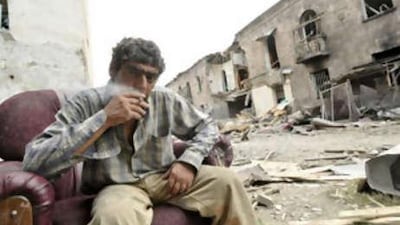When Vladimir Putin, the Russian prime minister, flew on Saturday from Beijing to the Russian city of Vladikavkaz, just beyond the border from South Ossetia, to oversee Russian military operations in the Caucasus, it was a signal that things, at least for Georgia, would not go well. Mr Putin, arguably Russia's most powerful man, had come to power in 2000 by making similar junkets to the Caucasus and talking tough about another rebellious swathe of territory on his country's southern frontier - Chechnya.
In a ruthless demonstration of the Kremlin's determination to hold sway over the Caucasus at almost any cost, up to 50,000 Chechens, mostly civilians, were either killed or went missing in the ensuing four years - this after 100,000 Chechen civilians had died in the early 1990s while Russia was trying to make a similar point. So there was an unmistakable air of inevitability yesterday when Dmitri Medvedev, the Russian president, announced he had ordered Russian forces to end their military operations in Georgia, saying they had succeeded in restoring "security" in the separatist enclave of South Ossetia.
In essentially declaring victory, Mr Medvedev also left no doubt about Russia's resolve. He warned that any renewed Georgian attacks in South Ossetia or Abkhazia, Georgia's other breakaway province, would be "liquidated" by Russian forces. Thus, under the pretext of stopping genocide, protecting its peacekeepers and safeguarding the residents of two separatist pro-Russian provinces to whom it has liberally granted Russian passports - perhaps in preparation for the day when they could intervene to defend them - the Kremlin appeared well on its way yesterday to imposing its will by military force on a tiny neighbouring state.
After Mr Medvedev's announcement, tens of thousands of Georgians gathered in the main square of their capital, Tbilisi, where they heard Mikheil Saakashvili, the president, declare that Russia was continuing its "ruthless, heartless destruction" of Georgian citizens. His assertion occurred as Mr Medvedev set out the key elements of a peace plan he had agreed with the European Union to resolve the conflict.
He called on Georgia to sign up to the plan, which was agreed with Nicolas Sarkozy, the French president, after three hours of talks in Moscow yesterday. Late last night Mr Sarkozy arrived in Tbilisi in a bid to get Mr Saakashvili, the Georgian president, to sign the agreement. The plan is a refined version of an earlier four-point plan proposed jointly by the EU and the Organisation for Security and Co-operation in Europe that Mr Saakashvili signed on Monday.
Key elements of the peace plan include the agreement to stop all fighting and allow free access to humanitarian aid, Georgian military forces are to return to their permanent bases and the Russian military is to return to the positions held before the current hostilities. The future of South Ossetia and Abkhazia remains unclear, with the agreement only saying discussions on their status would start in the coming days.
The facts on the ground yesterday spoke volumes. Last week, there were about 3,000 Russian peacekeepers in South Ossetia and Abkhazia, which together cast off direct Georgian rule in the 1990s. Five days after Georgia launched an unsuccessful lightning strike to assert its authority over South Ossetia, and Moscow retaliated by deploying what Mr Putin has repeatedly called a "peacekeeping mission", Russian troops were in complete control of South Ossetia and 9,000 Russian paratroopers and 350 armoured vehicles were ensconced in Abkhazia.
Amid the protests of the international community about its "disproportionate" military response in Georgia and its disregard for international frontiers, Russia has often appeared oblivious. Its behaviour was anything but inexplicable, however, for it is Russia's historical curse to suffer from delusions of both grandeur and weakness, often both at the same time. Still, it has emerged from the humiliating days of the mid- and late-1990s after Soviet communism imploded and the value of the rouble cratered to become what Marshall Goldman, a leading Russia scholar, has dubbed a powerful "petrostate" with no compunction about brandishing its muscle across Europe and Central Asia.
The Kremlin, however, fears the rainbow - the democratising "colour revolutions" that swept Ukraine in 2004 (orange) and Georgia in 2003 (rose) and threw out stale, authoritarian rule. In both cases, it has shown itself willing to use its abundance of oil and natural gas to punish and deter the spread of that virus near its borders, lest it infiltrate the Russian heartland. That willingness, proven once again this past week, has muzzled the response from the capitals of Europe, which rely on Russia's oil and natural gas.
To be sure, Mr Saakashvili has not emerged as a white knight. While he is doubtless justified in saying that Russia has deliberately fanned ethnic tensions in their claims over South Ossetia and Abkhazia, he acted out of extraordinary hubris by unilaterally trying to end secessionist South Ossetia's 16-year-old de facto independence. If Mr Saakashvili thought that a) Europe or the United States would come to his rescue when, inevitably, Russian military superiority asserted itself or b) Russia would not react to a relative pinprick with a sledge hammer, he was tragically mistaken.
With no small justification, Georgian voters could well send him packing if Moscow does not manage to oust him first. Still, it is an even more emboldened Russia that is now most worrying. Mssrs Putin and Medvedev would likely laugh if it was pointed out to them that Mr Saakashvili's stated motive for intervening in South Ossetia - to "restore constitutional order" - was identical to Russia's declared aim for intervening in Chechnya.
They probably would respond to this hypocrisy with an imperial shrug and, in effect, quote the 19th-century American philosopher Ralph Waldo Emerson: "A foolish consistency is the hobgoblin of little minds". But what appears to have happened in the Caucasus in the past week is not the product of "foolish consistency". It is an utterly deadly one, with profound implications for the people of Europe and Central Asia.
@Email:cnelson@thenational.ae

